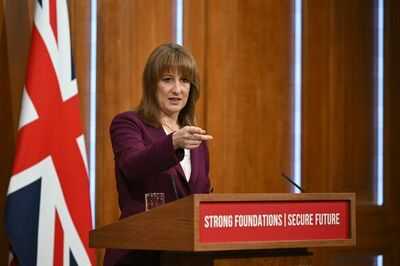
The government has declined to dismiss the possibility of tax rises for workers throughout the UK. This comes as Chancellor Rachel Reeves gears up to present her Budget in just a few weeks on November 26, which is anticipated to feature an array of significant economic measures.
Speculation regarding possible tax hikes to assist in filling the nation's financial gaps has been widespread, and whilst the government has not confirmed that levies will rise, it is not being dismissed. During an address from Downing Street, Ms Reeves emphasised that both international and domestic matters have resulted in the 'difficult decisions' she will take in the forthcoming budget.
This follows expectations that the Office for Budget Responsibility (OBR) will reduce its earlier projections for productivity, which Ms Reeves maintains has been "inherited from the last government".
Several economists forecast that Ms Reeves will need to find billions of pounds to fill a 'black hole' resulting from reversals in spending reductions and increased debt expenses.
Addressing the nation from Downing Street, she declared: "As I take my decisions on both tax and spend, I will do what is necessary to protect families from high inflation and interest rates, to protect our public services from a return to austerity and to ensure that the economy that we hand down to future generations is secure with debt under control.
"If we are to build the future of Britain together, we will all have to contribute to that effort. Each of us must do our bit for the security of our country and the brightness of its future."
Current Income Tax ratesCurrently, the standard Personal Allowance for what you earn before you need to start paying tax is £12,570. If you earn more than £100,000, your Personal Allowance will go down by £1 for every £2 that your adjusted net income is above £100,000 - this Personal Allowance is reduced to zero if your income is £125,150 or above.
If you have a standard Personal Allowance of £12,570, you will pay the following taxes:
- £12,571 to £50,270 (basic rate) - taxed at 20%
- £50,271 to £125,140 (higher rate) - taxed at 40%
- Anything over £125,140 (additional rate) - taxed at 45%
While this will be the rate paid by most workers across the UK, your taxes may differ slightly depending on whether you're employed or get a pension. For a full understanding of how much tax you pay, you can use the free GOV.UK tool to check your Personal Allowance tax code, how much tax you've paid this year, and how much you're likely to pay for the rest of the year based on current rates.
Further details on your current tax rates can be found here.
You may also like

Winning Euromillions numbers LIVE: Full lottery results with Thunderball on November 4

Stockport train station LIVE: Bomb squad on the scene as people urged 'do not travel'

Asmongold suggests Twitch uses a “whitelist” to shield some streamers from view-bot penalties

Every word Mikel Arteta said on Slavia Prague win, Mikel Merino, Max Dowman and new record

White House press secretary dodges question on Trump getting a sudden MRI scan: 'I'll check back...'







